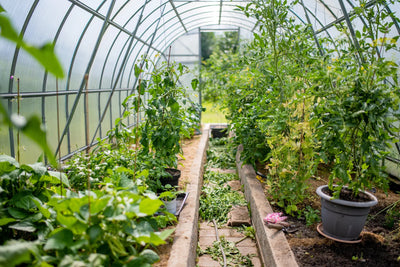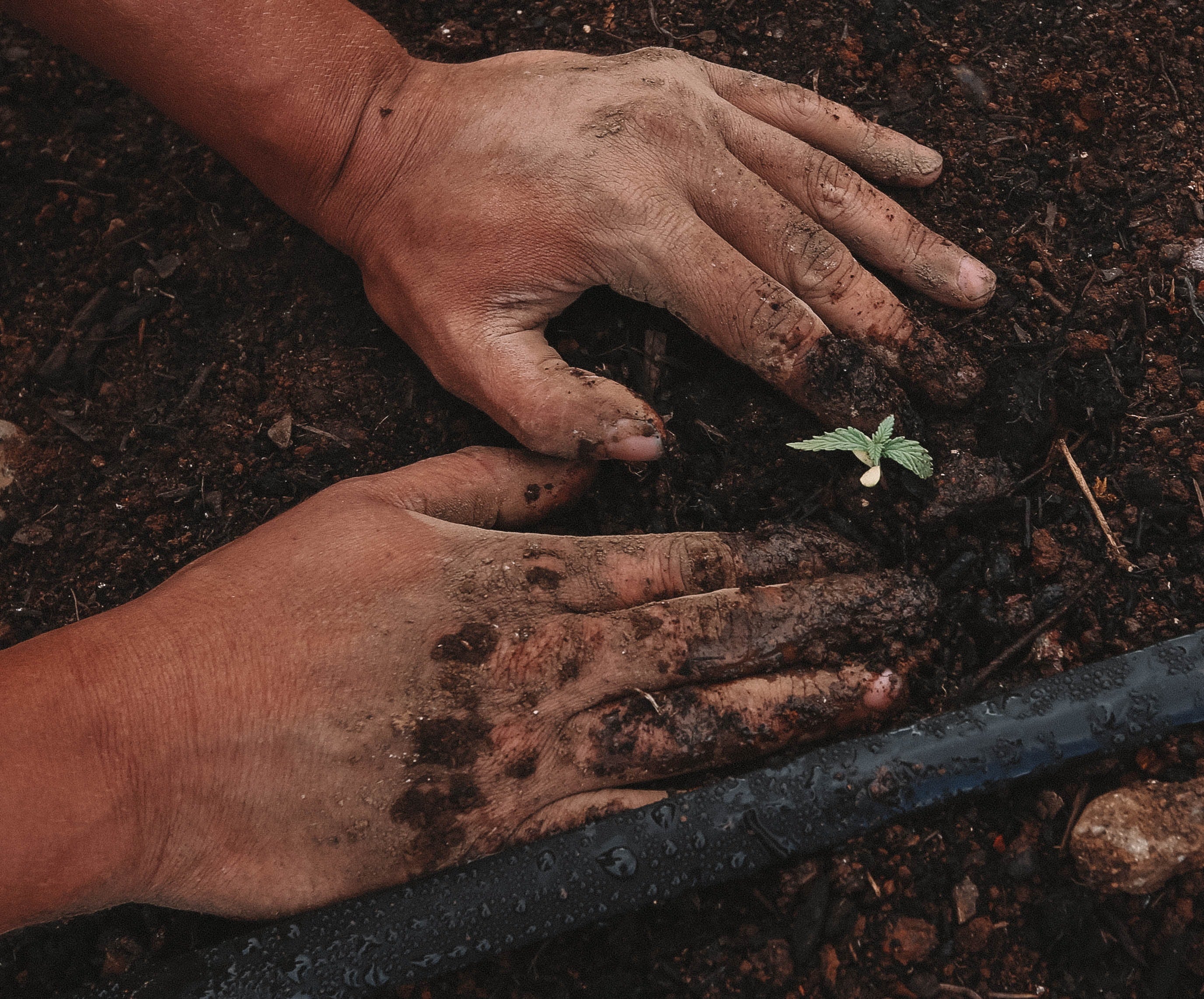Soil is the foundation of life. From the smallest plants to the largest trees, healthy soil is essential for growth. Unfortunately, soil degradation is an increasing global problem, threatening food supplies and biodiversity. But there's hope! By adopting sustainable gardening practices, you can do your part to restore the earth’s soils and ensure a fruitful harvest. In this article, we’ll explore what soil degradation is, how it impacts the global food supply, and how you can combat it by building a sustainable garden.
What is Soil Degradation?
Soil degradation occurs when the quality of soil declines due to factors like erosion, overuse of chemical fertilizers, deforestation, and unsustainable agricultural practices. This process leads to the loss of essential nutrients and organic matter, reducing the soil’s fertility and ability to support plant life.
Causes of Soil Degradation
- Erosion: The removal of the topsoil layer by wind and water.
- Deforestation: The removal of trees that anchor the soil, leading to erosion.
- Overuse of Fertilizers and Pesticides: Chemicals disrupt the natural balance of nutrients, harming microorganisms and reducing soil health.
- Monoculture Farming: Growing the same crop season after season depletes specific nutrients from the soil.
- Overgrazing: Livestock can compact the soil, making it harder for plants to grow.
The Alarming Impact of Soil Degradation on the Global Food Supply
Soil degradation is a significant threat to global food security. Here’s how it affects food production:
- Reduced Crop Yields: Degraded soil lacks the nutrients and structure to support robust plant growth, leading to lower crop yields.
- Loss of Arable Land: Each year, millions of acres of arable land are lost due to soil degradation, shrinking the land available for farming.
- Increased Food Prices: As fertile land decreases and yields drop, the cost of food rises, leading to food insecurity, particularly in vulnerable populations.
- Climate Change Impact: Degraded soil releases carbon into the atmosphere, exacerbating climate change, which in turn further stresses agricultural systems.
How to Build a Sustainable Garden to Combat Soil Degradation
The good news is that gardeners can take steps to protect and restore soil health. Building a sustainable garden is a fantastic way to combat soil degradation, improve local ecosystems, and produce nutrient-rich food for your household. Below are steps you can follow to create a sustainable garden.

1. Start with Healthy Soil
Healthy soil is the key to a successful garden. If soil degradation is affecting your garden, focus on enriching it by adding organic matter.
How to Improve Soil Health:
- Composting: Adding compost introduces beneficial microorganisms and nutrients back into the soil. It's a great way to recycle kitchen scraps and garden waste.
- Green Manure: Plant cover crops like clover or rye during the off-season. These crops prevent erosion and add nutrients back into the soil when tilled under.
- Mulching: Applying mulch helps to retain moisture, prevent erosion, and improve soil fertility as it decomposes.
2. Avoid Chemical Fertilizers
While chemical fertilizers may offer a quick nutrient boost, they contribute to long-term soil degradation. They can kill beneficial microorganisms, alter pH levels, and increase soil salinity.
Alternatives to Chemical Fertilizers:
- Organic Fertilizers: Use compost, manure, or other natural products to add nutrients.
- Soil Testing: Conduct a soil degradation test to understand what your soil needs. This way, you can add the right type and amount of nutrients without relying on synthetic fertilizers.
3. Rotate Your Crops
Crop rotation is a simple but powerful technique that prevents soil degradation by alternating the types of plants grown in a specific area.
Benefits of Crop Rotation:
- Nutrient Balance: Different crops have different nutrient needs. Rotating them helps to balance soil nutrients over time.
- Pest Control: Pests that thrive on one type of crop won’t have the chance to multiply if you plant a different crop in the next season.
- Soil Structure: Some crops, like legumes, can fix nitrogen into the soil, combating soil degradation.
4. Practice No-Till Gardening
Tilling, or turning over the soil, can cause soil erosion and disrupt the natural balance of microorganisms. By practicing no-till gardening, you protect your it from soil degradation.
How to Implement No-Till Gardening:
- Use Mulch: Cover the soil with mulch to protect it from erosion and retain moisture.
- Plant Cover Crops: These will naturally aerate the soil and prevent erosion.
- Avoid Disturbing the Soil: Instead of tilling, plant directly into the soil and let the natural processes of decay and regrowth take place, hindering soil degradation.

5. Embrace Permaculture Principles
Permaculture is a gardening philosophy that mimics natural ecosystems. It encourages biodiversity, sustainability, and nullifies the process of soil degradation.
Permaculture Practices to Enhance Soil Health:
- Polyculture: Grow a diverse range of plants together to mimic a natural ecosystem. This not only benefits the soil but also reduces the need for pesticides.
- Water Management: Use rainwater harvesting systems, swales, or drip irrigation to reduce water waste and prevent soil erosion.
- Compost Piles and Worm Farms: Set up composting systems that also help break down organic matter faster and contribute to healthier soil.
6. Conserve Water Wisely
Soil degradation often leads to poor water retention, which can dry out the soil. Conserving water helps maintain soil structure and health.
Water Conservation Tips:
- Drip Irrigation: Instead of using overhead sprinklers, install a drip irrigation system to deliver water directly to the roots.
- Rain Barrels: Capture and store rainwater for garden use.
- Plant Native Species: Native plants are adapted to local conditions and typically require less water and fertilizer.
7. Use Heirloom Seeds
Heirloom seeds are a fantastic way to ensure you're growing plants that have adapted to local conditions and can thrive in a variety of soils. Unlike genetically modified seeds, heirloom seeds are open-pollinated and produce plants with rich genetic diversity, helping build resilience from soil degradation over time.
Why Heirloom Seeds are Better for Soil Health:
- Greater Biodiversity: Heirloom seeds maintain genetic diversity, which can improve the health of both plants and soil.
- Natural Adaptation: Heirloom plants adapt to local soil conditions, which can reduce the need for external inputs like fertilizers.
- Better for Seed Saving: You can save seeds from heirloom plants year after year, nullifying any processes of soil degradation.
Why Building a Sustainable Garden Matters
Building a sustainable garden isn't just about growing food – it's about healing the planet. The choices we make as gardeners can either contribute to soil degradation or help to restore and regenerate the earth's ecosystems. By focusing on sustainable practices like composting, no-till gardening, and using heirloom seeds, you're actively combating soil degradation and contributing to the global solution for food security.
Grow a Garden That Nourishes the Planet with Seed Armory's Organic Heirloom, Non-GMO Seeds!
Before you dive into building your sustainable garden and soil degradation, make sure you’re planting seeds that will thrive while protecting the environment. Seed Armory offers a wide selection of organic heirloom, non-GMO seeds that help restore soil health and promote biodiversity. By choosing these seeds, you’re not only growing your own food but also contributing to long-term soil restoration.
Explore some of Seed Armory's top collections:
Ultimate Heirloom Seed Vault – A powerhouse of 30,000+ heirloom seeds perfect for starting or expanding your sustainable garden.
Patriot Survival Seed Vault – Designed for self-sustainability, this collection features 21 types of easy-to-grow, nutrient-dense crops.
Medicinal Herb Seed Vault – Grow your own herbal remedies with this incredible collection of over 25 medicinal herb varieties.
Invest in your garden's future with these high-quality heirloom seeds from Seed Armory and take a step toward a healthier planet.
The Power of Your Garden: A Small Step Toward a Healthier Planet
Soil degradation is a serious threat to our global food supply, but it’s a challenge that we can all help address. By building a sustainable garden, you can protect and improve soil health while also enjoying fresh, nutrient-rich food. From composting to water conservation, the steps you take in your own backyard can make a significant difference in the fight against soil degradation. With healthy soil, we can ensure that our gardens – and the planet – will continue to thrive for generations to come.











